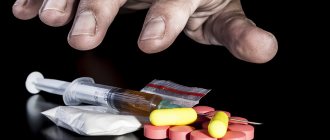The Russian Criminal Code contains a number of articles that provide for liability for various drug-related offenses, including their distribution, storage, manufacturing, processing and transportation.
Info
Punishment for selling drugs is provided for in accordance with Article 228.1 of the Criminal Code.
The sanction under this article is determined by the volume of drugs, as well as circumstances that aggravate the guilt of the convicted person, which include the commission of the act by an official, sale to persons under 18 years of age or in a public place.
What is the punishment for selling drugs?
Selling drugs illegally is generally punishable by imprisonment ranging from 4 to 8 years, either with or without restriction of liberty.
Attention
If there is an aggravating element—the sale occurs in a public place—then the punishment will range from 5 to 12 years, and a fine of up to half a million rubles may be imposed.
With a significant sales volume
According to paragraph 3 of Article 228.1, in the presence of such aggravating circumstances as sale as part of a group, between the participants of which there was a preliminary conspiracy or if the amount of substances sold is significant, the violators will face imprisonment for 8–15 years, accompanied by a fine of up to half a million.
Info
The limit of significant size depends on what substance the convicts were selling. For hashish, the threshold for significant size is two grams. For marijuana, this figure is six grams.
If there was a large amount, then the range of imprisonment will be from 10 to 20 years.
Important
The large size threshold for hashish is 25 grams, for marijuana - one hundred grams, and for methadone and heroin - 2.5 grams each.
Finally, if the amount is particularly large, the duration of the punishment increases to 15–20 years, and the possible fine – up to one million rubles. In this case, life imprisonment may be imposed.
Attention
A particularly large size for hashish is ten kilograms, for methadone and heroin - a kilogram each, and for morphine methyl bromide - half a kilogram.
If police officers are involved in drug trafficking
It is assumed that when carrying out activities of this kind the employee used his own status. In such a situation, Part 4, paragraph “b” of Article 228.1 applies. The duration of imprisonment will be 10–20 years.
When selling to minors
This act is also qualified under Part 4, paragraph “b” of Article 228.1. And the duration of imprisonment is from 10 to 20 years.
How to correctly determine the size of drugs?
Size is of significant importance in this criminal act. The correct qualification and the time that the convicted person will spend behind bars depends on it. But getting a suspended sentence for selling drugs is unrealistic, you shouldn’t even dream about it.
All drugs presented below are considered completely prohibited . Their sizes are determined by the following values:
- Spice : significant - 0.01 g, especially large - 500 g;
- Heroin : significant - 0.5 g, large - 2.5 g, especially large - 1 kg;
- Opium : significant - 1 g, large - 25 g, especially large - 5 kg;
- Anasha, hemp, hashish : significant - 2 g, large - 25 g, especially large - 10 kg;
- Ecstasy-type tablets and their derivatives : large - 0.6 g, large - 3 g, especially large - 600 g;
- Methamphetamine : significant - 0.3 g, large - 2.5 g, especially large - 500 g;
- LSD : significant - 0.0001 g, large - 0.005 g, especially large - 0.1 g;
- Ephedrone : significant - 0.2 g, large - 2.5 g, especially large - 500 g.
Obviously, the most stringent size requirements apply to the drugs LSD . They have a very simulating effect on the body, quickly wear out the cardiovascular system, which is why heart attacks and strokes often occur from an overdose.
Determination of guilt in the sale of narcotic substances
Info
The fact of drug sales is established through the process of controlled procurement.
Investigators receive information that a certain person is preparing to sell drugs, in particular, acquires a significant batch, produces the drugs themselves, packages them or directly sells them.
Next, employees carry out operational search activities:
- Conduct surveillance of the suspect;
- They install wiretapping of his telephone conversations;
- Identify buyers;
- They are interviewing those who purchased drugs from him.
As a result, investigators are convinced that illegal activity took place.
Info
However, the activities described above require significant resources. Usually they resort to it when it is necessary to expose a group rather than an individual offender.
If we are talking about such a violator, then in this situation the police usually simply arrest another person if they know that he is in possession of drugs, most often for the purpose of their own use. However, they are not too interested in its composition and storage. They invite him to tell him who sold him the drugs. Officers then invite the detainee to purchase drugs from the person who usually sells them to him in a controlled purchase.
Employees give him marked bills and provide him with equipment . After fixing the completed transaction, the seller (or their group) is delayed. And the person who stored the drugs is not held accountable.
Attention
At the same time, the answer to the question whether operatives have the right to bring to justice the person who sold drugs in such a situation is negative. The reason is that it is a provocation.
The standard procedure is that after receiving information, officers are required to collect evidence that confirms that drug sales are taking place, which was not done in this case. In addition, selling drugs requires that the seller take the initiative. In case of provocation, the initiator becomes the buyer, who himself takes actions so that prohibited substances are sold to him. If there is such an initiative from the buyer, sales cannot be discussed.
Important
And a person detained for selling prohibited substances may try to demonstrate that there was provocation, in which case he will be released from liability.
At the same time, he can still be charged with possession, but for this act the term is significantly lower - up to three years, and this term itself will be suspended.
Features of drug addiction
Drugs are chemical substances, the circulation of which is legally limited, that have a psychotropic, sedative or stimulating effect on the human body. The use of such substances results in persistent mental and physical dependence.
The fight against drug addiction is overwhelming for those who are trying to get out of this circle on their own. Young people or their parents have to seek help from drug addiction or rehabilitation centers.
Every year the list of prohibited drugs expands with the emergence of new types or the improvement of existing formulas of substances.
Drug manufacturers, trying to circumvent existing laws, change the chemical formulas of substances or the proportions of their components, thereby creating new drugs that are not yet included in the list of prohibited drugs.
The following categories of people are at risk of potential drug addiction:
- Driven people;
- Children from dysfunctional families or families of drug addicts;
- Children from too rich families, left to their own devices and with large amounts of unearned money at their disposal;
- Young people who want to get “quick money”;
- People who are lonely or severely depressed;
- Unemployed;
- People who have access to drugs due to their official position.
In fact, anyone can become a drug addict . No matter how hard law enforcement officers fight against dope suppliers, it is still extremely easy to buy it.
Sales of synthetic drugs in 2019
Synthetic drugs, such as salts, spices and artificial marijuana, promote aggression.
Spice has a lot of synonyms - legal, salt and speed . They come in many forms—as incense, bath salts, smoking mixtures, and insect repellents. They can be taken with food, chewed like gum, or smoked.
There is an opinion that spice is not a drug, but it is incorrect. Spice makes the user feel inadequate, he sees voices, hallucinations occur, and schizophrenia is noted. As a result, the use of such compounds in Russia is not allowed.
Info
When selling substances of synthetic origin classified as prohibited, the offender will receive four years in prison. If a similar act is committed as part of a group or on a particularly large scale, then you can go to prison for up to 15 years.
Attempted sales: the difference with direct sales
There are two types of sales according to the criterion of completion:
- Finished.
- An assassination attempt, in other words, a sale that was not completed.
The difference between these acts is significant.
Important
The completed sale suggests that drugs have changed hands, as well as money.
Unfinished sale suggests that the act was not completed for one reason or another.
For an attempt, the punishment is milder; at a maximum it will not exceed ¾ of the maximum sanction that exists for a completed crime.
Who should I contact with information about such crimes?
If you have information about illegal drug trafficking activities, you must contact the competent authorities. It will be useful to call the following useful numbers:
- 8(495) 159-31-93 — a public organization to combat drug addiction at the regional level;
- 8 — “Russia without drugs” - a union of public associations;
- 8 — Committee on Combating Drug Addiction (international).
- (812) 573-21-81 The police accept reports of drug sales by calling 102. National police helpline.
Info
8-800-345—67-88 - a single anti-drug number.
Anonymous reports of drug sales can be sent to e-mail [email protected] or directly to the Ministry of Internal Affairs portal,
How can you prove that drug sales are taking place?
Among the evidence that can confirm this fact:
- Recordings of telephone conversations;
- Testimony of third parties;
- Video recordings depicting the manufacture of drugs, their transportation and sale;
- Correspondence.
Judicial practice in drug cases
A number of cases in this area will be described below:
- Case 1. In the Russian capital, an inspector from the regime and security department of one of the pre-trial detention centers was arrested. He was engaged in selling drugs to persons held in this detention center. During the search, over one kilo of cannabis was found in the suspect's apartment. In addition, the phone numbers of his accomplices were found in the inspector’s office. As a result, the accused received ten years in prison;
- Case 2. A young man came to Russia and got a job as a courier, but in reality he was putting spice in the agreed upon hiding places. One day he was detained during a raid and eventually sentenced to six years in prison;
- Case 3 A Volgograd resident was exposed for drug trafficking thanks to recordings obtained from surveillance cameras. He admitted his participation in the sale and contributed to the exposure of the leader. He was eventually sentenced to four years behind bars.
Info
Moreover, the minimum term of imprisonment for participation in the sale of prohibited substances is precisely four years.
In the presence of aggravating circumstances, in particular when selling on a large or especially large scale or by a person holding a certain position or by several persons as part of a group, the person found guilty will face a very long sentence, the duration of which will be from 10 to 20 years. In addition, he could be sentenced to life imprisonment.
Judicial practice for 2021
According to statistics, the number of crimes in the field of drug trafficking is growing rapidly. In 2021, the number of such cases has tripled. The number of cases of drug sales increased by 9% compared to the previous year.
Drug addicts and drug traffickers make up one third of all convicts according to the Federal Penitentiary Service of the Russian Federation.
And these huge figures are recorded even though half of these cases remain unsolved. That is, in fact, there should be even more such criminals.
Moreover, the bulk of those convicted are ordinary drug addicts who were convicted of possessing drugs purchased for themselves . Large dealers, however, continue to walk free, only regularly replacing jailed “runners” with new ones.
When convicting criminals for drug possession, investigators, by default, charge them with purchasing prohibited drugs, although they often do not actually prove this. This is not entirely correct, because this violates the rights of the convicted.
The bulk of drug distribution cases are solved by “live fishing,” when police officers themselves contact traffickers on social networks and catch them at the moment of laying out bookmarks.
Drug addiction is a serious problem not only in third world countries, where selling illegal substances is the only way to make money.
Unfortunately, drug addiction is rapidly spreading in civilized developed countries of the world. In Russia, the number of crimes under Art. 228 and art. 228.1 of the Criminal Code of the Russian Federation raises serious concerns about the future of our youth.









